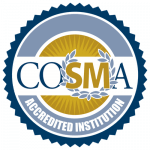History & Accreditation
History
1815
Nichols Academy was founded by Amasa Nichols, a wealthy Dudley industrialist. Samuel Slater, “the father of cotton manufacture in the United States,” who owned mills in the nearby town of Webster, was an early benefactor.
Textile manufacturer Hezekiah Conant donated three buildings during the 1800s; Academy Hall, Conant Hall and the Chapel. Nichols Academy closed in 1909.
1931
Nichols Junior College was founded on the Academy campus by James Lawson Conrad.
The first junior college for men in the East, Nichols was also the first junior college in Massachusetts to grant an Associate’s degree in Business Administration. Nichols closed during World War II, when President Conrad was called into service.
1946
Nichols Junior College was reopened by President Conrad.
1954
The School of Forestry at Nichols College was established, offering business management together with forest management. At the time, it was the only such undergraduate program in the country.
1958
Nichols became a four-year college and offered the degree of Bachelor of Business Administration. The College added four new dormitories and a new library building.
Nichols athletics gained a home with the Chalmers Field House, including swimming pool and facilities for varsity and intramural sports. The former gymnasium was renovated into a 700+ seat auditorium.
1965
Nichols earned accreditation from the New England Association of Schools and Colleges.
1970
The Board of Trustees voted to admit women to Nichols for the first time since Academy days.
The College began to offer programs leading to degrees other than the Bachelor of Business Administration.
1971
Nichols was granted authority to offer the Bachelor of Arts (BA), Bachelor of Science in Business Administration (BSBA) and Bachelor of Science in Public Administration. It also offered a new Educator Preparation Program.
1974
Nichols first offers the degree of Master of Business Administration (MBA).
1980
Nichols established the Institute for American Values (renamed the Robert C. Fischer Policy and Cultural Institute in 1999) as a division of the College, providing a forum for the free exchange of ideas.
1997
Sport Management was initiated as a new academic business specialization.
1998
Dr. Debra M. Townsley was named as the College’s sixth, and first female, president.
Nichols established an innovative new curriculum including a Current Issues Symposium and Professional Development Seminar.
1999
The Educator Preparation Program was re-established as an academic specialization.
2002
Criminal Justice Management and Business Communication were initiated as new academic specializations.
2004
Nichols collaborated with the Alabama-based United States Sports Academy to deliver an MBA degree with an emphasis in Sports Management. It was the first accredited Sports Management MBA in the country to be available 100 percent online.
2005
The MBA program celebrated its 30th anniversary. Beginning in 1974 with an enrollment of 11 students, the College now offers one of the largest MBA programs in Central Massachusetts.
Nichols dedicated Lombard Dining Hall and Vendetti Field at Homecoming and opened a new multi-purpose stadium.
The Board of Commissioners for the International Assembly for Collegiate Business Education (IACBE) granted accreditation for Nichols College business and business-related degree programs.
2006
Nichols Student Government Association celebrated its 30th anniversary and the Fischer Institute celebrated its 25th.
2007
The START youth leadership training program brought 90 ninth graders from Massachusetts, Connecticut, and Rhode Island to campus, demonstrating Nichols’ commitment to leadership education.
The College receives approval from the Massachusetts Board of Higher Education to offer a Master of Organizational Leadership.
A new academic program is introduced: a BSBA in Art & Entertainment Management.
2008
At 1,088 day students, the fall semester marked the largest day enrollment.
The first apartment-style residence hall, Copper Beech I, opened and Olsen Hall was transformed with a “green” renovation.
The “A to B” Business Program was implemented with four Massachusetts Community Colleges: Quinsigamond, Massasoit, Mount Wachusett and Cape Cod.
2009
A new academic program is introduced: a BSBA in Hospitality Management.
Copper Beech II, the second apartment-style residence hall on campus, opened.
The “A to B” Business Program expanded to include MassBay Community College.
Nichols opened a satellite campus in Palm Beach, Florida.
2010
In April, President Debra Townsley resigned. The Board of Trustees appointed Trustee Emeritus Gerald Fels as Interim President and formed a President Search Committee.
Attendance at Fischer Institute events passed the 50,000 mark.
2011
Susan West Engelkemeyer, Ph.D., was officially installed as the seventh Nichols College president during an inauguration ceremony on October 21, 2011.
2012
The Fels Student Center, named in honor of Gerald ’66 and Marilyn Fels, is dedicated on November 16, 2012.
2013
A Certificate in Entrepreneurship is initiated.
The College receives approval from the Massachusetts Board of Higher Education to retitle its Master of Organizational Leadership degree to Master of Science in Organizational Leadership.
The Institute for Women’s Leadership is established with the goal of developing the leadership potential of female students, and serving as a resource and authoritative voice on women’s leadership for the community at large.
2014
The new Emerging Leaders program begins with the introduction of the new LEAD101 class.
Nichols begins the celebration of its Bicentennial.
Nichols undergraduate day enrollment reaches an all-time high of 1,213.
2015
An academic building, designed to be LEED certified and provides state-of-the-art team-building classrooms, is dedicated on September 18, 2015.
A significant renovation to the Recreation & Athletic Center opens in the fall.
Nichols ends the celebration of its Bicentennial. The Legacy Campaign aiming to raise $45 million is announced.
The Leadership Early Acceptance Program (LEAP) is launched.
The College receives approval from the Massachusetts Board of Higher Education to offer a Master of Science in Accounting.
The Office for International Engagement is established with the goal of heightening awareness of our global initiatives, resources, and services for expanding the international reach of Nichols College.
2016
Three new academic programs are introduced: a Bachelor of Arts in Criminal Justice, a Bachelor of Arts in Communication, and a BSBA in Integrated Marketing Communication.
Nichols’ environmentally conscious academic building is awarded LEED (Leadership in Energy and Environmental Design) Gold certification from the U.S. Green Building Council (USGBC), a national organization that certifies buildings that are “green” and sustainable, and protect the environment.
2017
The College receives approval from the Massachusetts Board of Higher Education to offer a Master of Science in Counterterrorism.
2019
Three new business concentrations were introduced: corporate finance and investments, digital and social media marketing, and marketing analytics.
2020
Business analytics was introduced as a new business concentration.
Cybersecurity for the Global Environment Certificate launched.
2021
Six new concentrations were introduced: Entrepreneurship, Nonprofit Management, Criminal Psychology, Sport Marketing & Content Creation, Sport Sales & Strategy, and Real Estate Management.
Glenn M. Sulmasy, JD, LL.M, was named eighth president of Nichols College on July 1, 2021.
2023
Nichols College earns AACSB International Accreditation. AACSB is the longest-serving global accrediting body for business schools, and the largest business education network connecting learners, educators, and businesses worldwide.
2024
William Pieczynski begins his tenure as the ninth president of Nichols College on May 1, 2024.
Accreditation
Nichols College is accredited by the New England Commission of Higher Education (formerly the Commission on Institutions of Higher Education of the New England Association of Schools and Colleges, Inc.).
Inquiries regarding the accreditation status by the Commission should be directed to the administrative staff of the institution. Individuals may also contact:
New England Commission of Higher Education
3 Burlington Woods Drive, Suite 100
Burlington, MA 01803-4514
(781) 425-7785
E-Mail: info@neche.org
AACSB Accreditation
Synonymous with the highest standards of quality, AACSB accreditation inspires new ways of thinking within business education globally. As a result, less than 6 percent of the world’s schools offering business degree programs hold AACSB business accreditation. Through today’s ratification, a total of 980 institutions across 60 countries and territories have earned AACSB accreditation in business. Furthermore, 193 institutions maintain supplemental AACSB accreditation for their accounting programs.
AACSB accreditation ensures continuous improvement and provides focus for schools to deliver on their mission, innovate, and drive impact. AACSB-accredited schools have successfully undergone a rigorous review process conducted by their peers in the business education community, ensuring that they have the resources, credentials, and commitment needed to provide students with a first-rate, future-focused business education.
COSMA Accreditation
The Sport Management degree program at Nichols College has received specialized accreditation through the Commission on Sport Management Accreditation (COSMA) located in Fort Collins, Colorado, USA. The sport management programs in the following degree is accredited by COSMA:
- Bachelor of Science in Business Administration with a concentration in Sport Management
- Bachelor of Science in Business Administration with a concentration in Sport Marketing & Content Creation
- Bachelor of Science in Business Administration with a concentration in Sport Sales & Strategy


